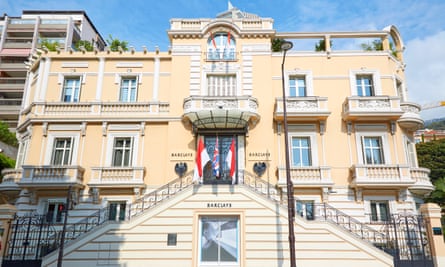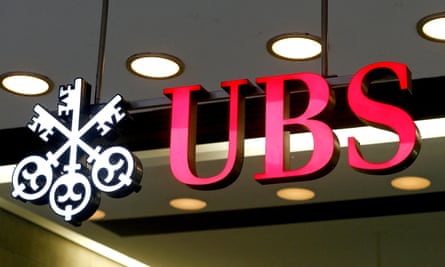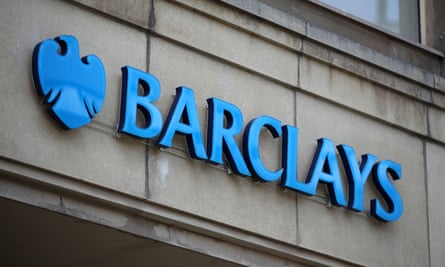Barclays and UBS are facing questions about their ties to Roman Abramovich after his secretive offshore trusts were reorganised shortly before Europe and the UK imposed sanctions on the Russian oligarch.
The Oligarch files, a cache of leaked documents seen by the Guardian, suggest that before Russia invaded Ukraine the two banks held at least $940m (£760m) of assets on behalf of Abramovich’s trusts and companies he ultimately owned.
However, shortly before Moscow launched its invasion the 10 offshore trusts were rapidly rearranged to transfer beneficial ownership of a significant portion of Abramovich’s vast fortune to his children.
Q&AWhat are the Oligarch files?
Show
The Oligarch files is a cache of leaked confidential documents containing emails, banking records, company filings, trust documents and compliance reports. The files originate from the Cyprus-based offshore service provider MeritServus. Located in Limassol, MeritServus helps its clients set up and manage offshore companies and trusts to shelter their wealth.
Cyprus, an EU member state, has long served as a major offshore financial centre for wealthy Russians who have favoured the Mediterranean island as a destination to harbour their fortunes. Roman Abramovich appears to have been a client of MeritServus for more than 20 years. Holding assets in offshore havens such as Cyprus, sometimes via trusts, is not in or of itself illegal, and there are legitimate reasons why some people do it.
The files were shared with the Guardian by an anonymous third party. A file in the leak suggests the data was obtained by hackers calling themselves "Freaky crew". The Guardian is only publishing stories based on files in the leak where it believes there is a public interest justification for doing so.
Documents suggest that in the last week of February 2022, as the reorganisation was completed, Barclays and UBS were informed that Abramovich’s children had become the ultimate beneficial owners of financial assets managed by the banks.
On 10 March, the UK government imposed sanctions on Abramovich for allegedly maintaining close relations with Vladimir Putin. The EU followed with its own sanctions on 15 March. Abramovich has denied the allegations and is appealing against the EU measures.
The files originate from the Cyprus-based offshore service provider MeritServus, which has managed Abramovich’s financial interests for more than 20 years. The firm administered 10 trusts established to benefit Abramovich and a sprawling network of offshore companies.
The documents raise questions about how Barclays and UBS responded to the changes and whether, since sanctions were imposed on Abramovich, they have allowed the children to financially benefit from assets that until that month were beneficially owned by their father.
A source with direct knowledge of the management of accounts held by the Abramovich trusts at Barclays said the bank acknowledged the changes to the trusts. Precise details of the steps subsequently taken by Barclays remain unclear.
In Switzerland, the Guardian’s reporting partner on the Oligarch files, Tamedia, has learned that UBS moved to prevent the attempted transfer of beneficial ownership of accounts at the bank to Abramovich’s children, but specific details of UBS’s actions are not known.
Both Barclays and UBS did not answer questions about whether they have allowed Abramovich’s children to benefit from funds held by the trusts once sanctions were imposed against their father. Both banks said they could not comment on whether a person is a client or not.

A spokesperson for Barclays said it “understands the importance of sanctions regulations” and takes its obligations “very seriously”. A representative for UBS said it complies “with all relevant sanction requirements”.
Neither Abramovich nor his children responded to detailed requests for comment.
The documents, however, shed light on longstanding relationships between private wealth divisions at the two banks and opaque offshore trusts sheltering the riches of one of Russia’s wealthiest men.
According to the files, Abramovich was a client of UBS’s global family office unit in Zurich that advises the bank’s wealthiest clients. For Barclays, the relationship was handled by a branch of its exclusive private bank in Monaco.

The source familiar with the Barclays relationship described the Abramovich family as one of the Monaco office’s most important clients.
Analysis of financial statements in the leak suggest that in the six months before the reorganisation, companies owned by just three of the trusts held at least $785m with UBS and at least $155m with Barclays.
Under UK and EU sanctions law, a bank is required to freeze assets if they are owned 50% or more by a sanctioned person. Freezes can also be applied when the sanctioned person owns less than 50% of the asset but exercises direct or indirect control over it.
After the invasion of Ukraine, Switzerland broke with its tradition of political neutrality and has largely adopted EU sanctions packages intended to punish Russia. Monaco also said it would implement the EU measures.
Sanctions experts said the reorganisation of Abramovich’s trusts could complicate attempts to freeze assets which, until the changes were made, were beneficially owned by Abramovich.

But they said in these circumstances banks should be cautious about allowing the children to benefit from the accounts, even though they are not subject to any financial sanctions themselves.
In July 2022, the UK’s sanctions watchdog and the National Crime Agency issued a “red alert” listing common techniques used to evade financial sanctions, which included transferring assets to proxies such as relatives and reducing ownership of assets to below the 50% threshold.
Three days before Russia’s military attacked Ukraine, on 21 February 2022, the Cyprus-based trustees administering the Abramovich trusts wrote to Barclays’ “Russia and emerging Europe” unit at the bank’s ornate office overlooking Monte Carlo.
Providing an update to the beneficial ownership structure of companies held by the Zeus Trust, the trustees at Meritservus said Abramovich’s children were “entitled to 51% of any distributions” from the trust’s funds. For the Europa Trust, they disclosed that Abramovich’s children had replaced him as beneficiaries.
On the day of the invasion, 24 February, the trustees began sending a similar bundle of paperwork to UBS in Zurich.

The documents updated information held by the bank about who ultimately benefited from accounts managed for at least five of the trusts – the Grano Trust, HF Trust, Zephora Trust, Europa Trust and Zeus Trust – as well as a series of associated offshore companies.
Sanctions lawyers who advise large financial institutions said that in these circumstances a bank would have to determine whether, in reality, Abramovich still exercises any direct or indirect control over the assets.
“They’re going to have to perform an analysis and when you’re into that territory it’s very much about your risk tolerance,” one of the lawyers said.
Barclays’ spokesperson insisted the bank had “robust systems, controls and processes in place” to prevent of circumvention of sanctions rules. “We are in regular communication with our regulators regarding sanction risks as well as our controls and oversight,” they said.
Demetris Ioannides, a managing partner of MeritServus, said trust law and data protection regulations prevented him from disclosing information to third parties. However, he said bank customers “must inform the bank immediately of any changes to the information given when a bank account is opened”.
He added: “Our organisation has always and will continue to fully comply with all anti-money laundering and sanctions regulations.”







